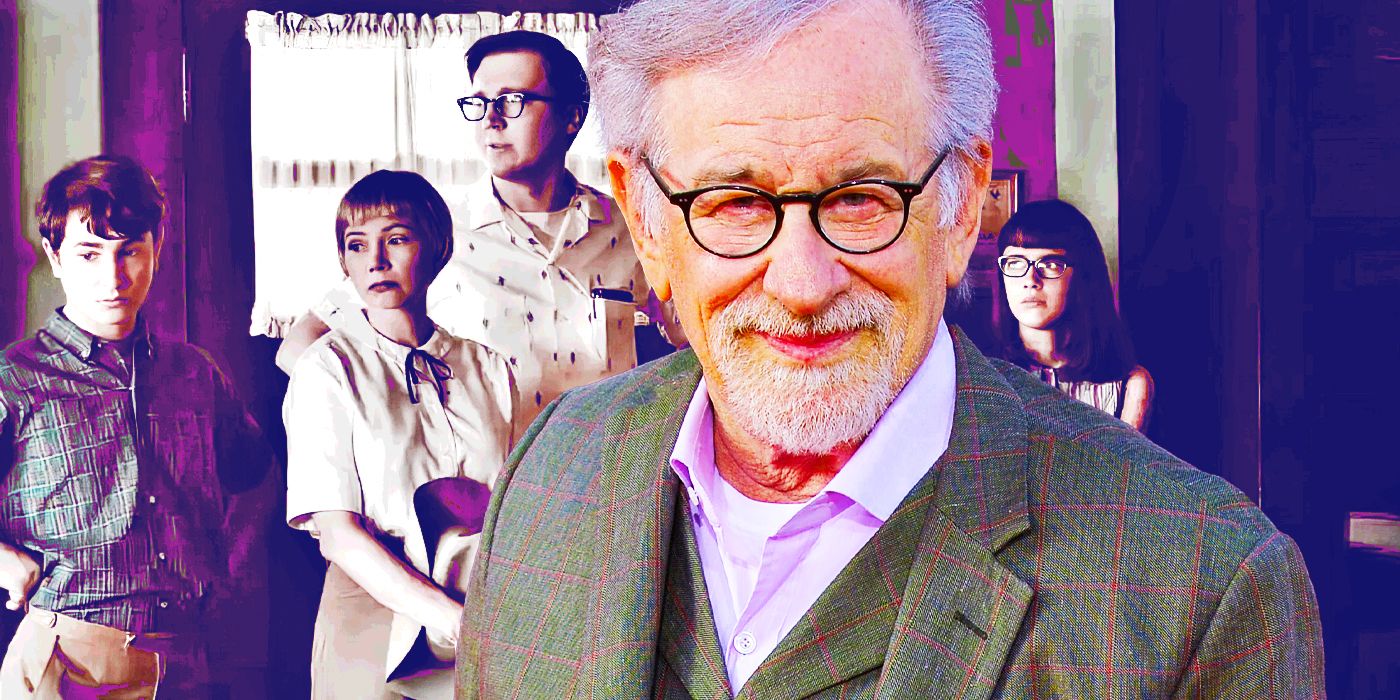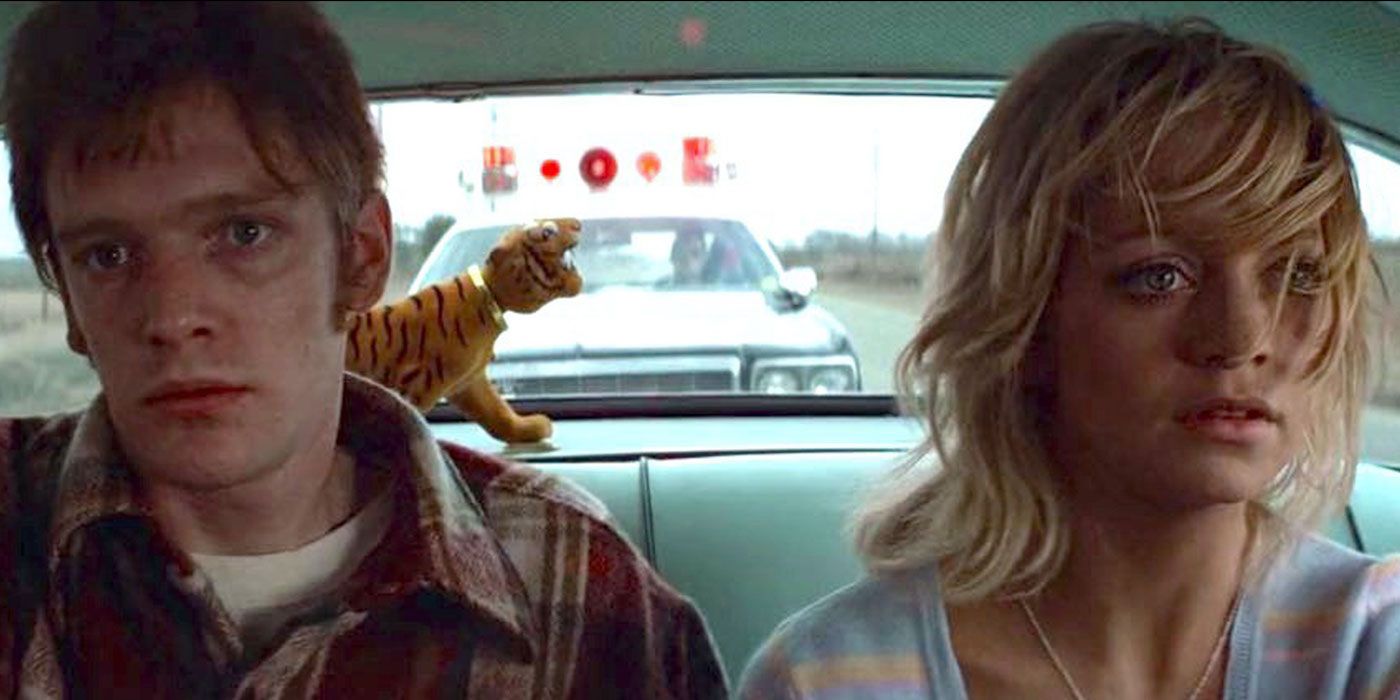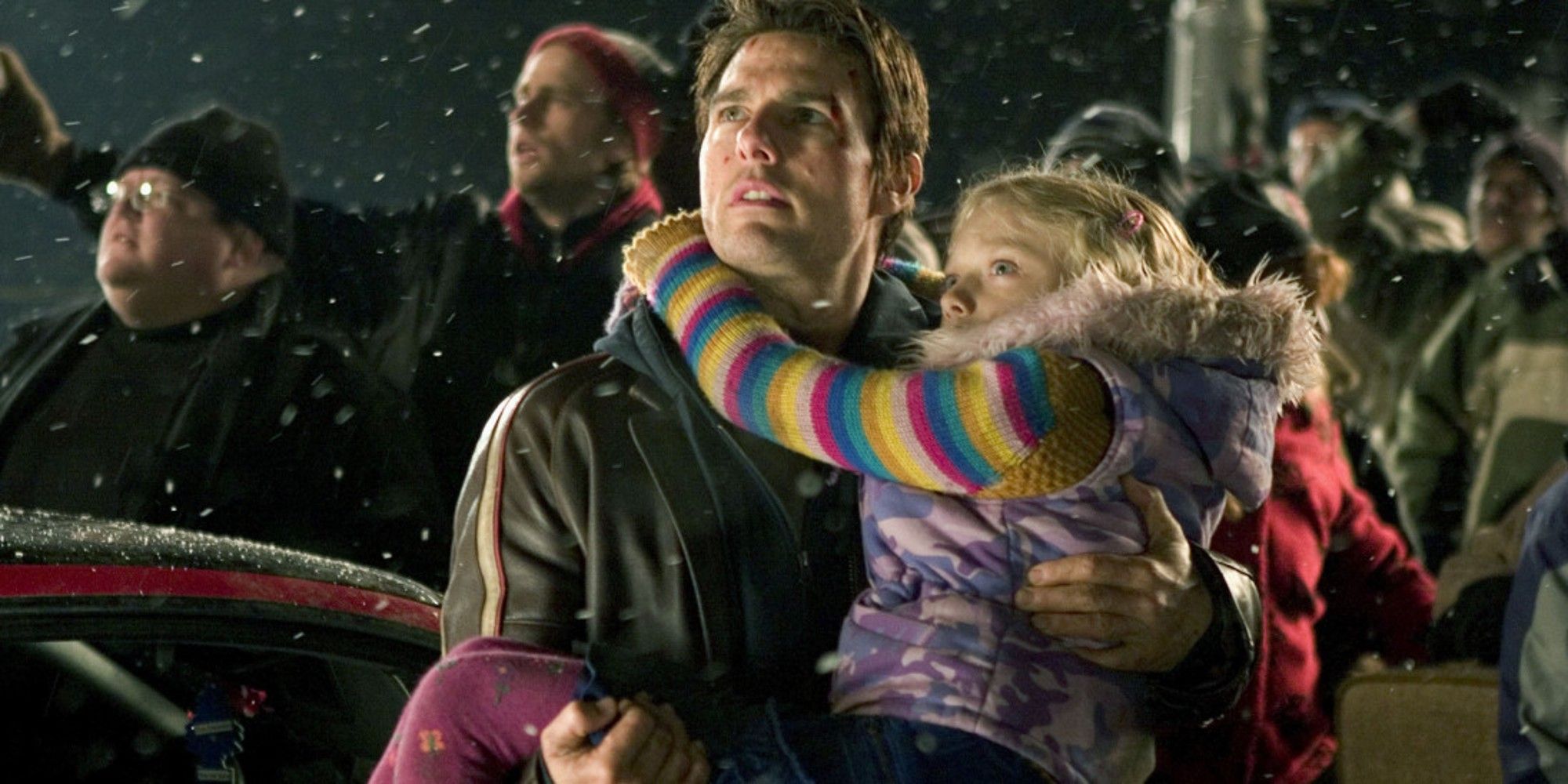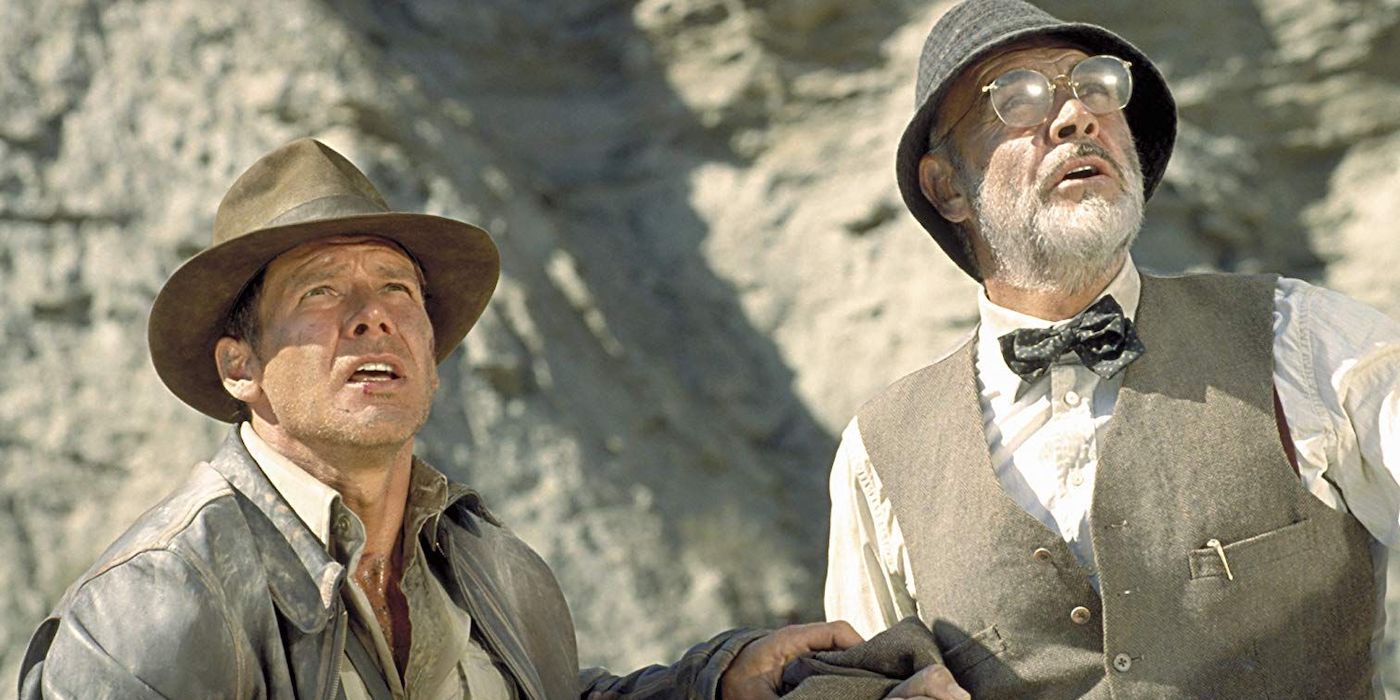Broken families being a thematic fixture of Steven Spielberg’s movies has become so well known that even parodies of this motif have become old hat. The divorce of Spielberg’s parents when he was 19 years old has left an unmistakable mark on the man and his work. This is especially apparent with the release of his newest motion picture, The Fabelmans, an autobiographical work that captures the fractured home life Spielberg grew up in. But though broken families play a major role in many of his movies, they don’t always appear in the same form throughout his many features. Not only that, but the depiction of broken families in his filmography drastically changes as he gets older. Though Spielberg has always been fascinated by this topic, he rarely tackles it the same way twice.
The Earliest Days of Spielberg’s Broken Families
Before the days of bikes shooting across the sky or dinosaurs letting out a mighty roar, Spielberg concerned himself with the exploits of two Southerners who just want to hold their kid again. For his first directorial effort (exempting the TV movie Duel), Spielberg helmed the crime drama The Sugarland Express. The premise of this feature concerns a pair of Texans, Lou Jean Poplin (Goldie Hawn) and Clovis Michael Poplin (William Atherton), who conspire to retrieve their kid, whose been taken by the state and placed with another family. With these lead characters being parents who stick together (even when Clovis Michael Poplin is in prison!) through thick and thin, it's a sharp contrast to Spielberg’s experience with parenthood, where the two people raising a kid split up.
This project established Spielberg’s love for stories about broken families, but also, in an interesting wrinkle, how Spielberg isn’t the chief architect of his movie’s narratives. Though he received a “Story by” credit, Spielberg did not pen the Sugarland Express screenplay. That honor would go to Hal Barwood and Matthew Robbins. In the years to come, Spielberg would only occasionally write the screenplays he’d direct. In other words, he didn’t craft a bunch of screenplays dealing with broken families and then helm them, he was drawn to pre-existing stories that often incorporated this concept.
One of the rare movies that Spielberg did get a screenplay credit for was the 1978 motion picture Close Encounters of the Third Kind. Protagonist Roy Neary (Richard Dreyfuss) has a wife, Ronnie (Teri Garr), and children, he’s not somebody navigating a household that’s been impacted by divorce. However, by the end of the movie, Neary does leave his family in disarray by choosing to hop aboard a UFO and go off into space with aliens. There’s no consideration for how this would impact his wife and kids, who would suddenly have to cope with the loss of their husband and father.
Spielberg has since said that his mindset in the 1970s of not having kids made him oblivious to the ramifications of the ending of Close Encounters and that he wouldn’t write the conclusion the same way today. However, this doesn't mean that Close Encounters of the Third Kind is totally apart from Spielberg's grappling with broken families. James Lipton, in 2005, made an astute observation that Spielberg's father was a computer scientist, and his mother was a musician. Lipton then notes that the way human scientists and aliens are finally able to communicate is through music. It's a blending of the interests that fascinated Spielberg's parents, a depiction of these two forces finding the kind of unity again that they couldn't achieve in reality. Spielberg humorously notes that this was unintentional to Lipton, but it's still a reflection of how deeply this theme runs through Spielberg's work that parallels his parent’s divorce and manifests subconsciously in films like Close Encounters of the Third Kind.
Kids Grapple With the Darndest Things
In the 1980s, Spielberg grappled with the concept of broken families through a new lens: children. Whereas his 1970s films had adult protagonists, Spielberg embraced adolescence with E.T.: The Extra-Terrestrial. The lead character of this film, Elliot (Henry Thomas), is a boy living with his mom and two siblings while the absence of their father looms large over their lives. Elliot is significantly younger than Spielberg was when his parents split up, but that sense of uncertainty that’s gripping Elliot seems to come from such an authentic place. The presence of Elliot’s younger sister, Gertie (Drew Barrymore), also can be seen as a nod to Spielberg’s three younger sisters. Parental divorce is not the only aspect of Spielberg’s home life that is making its way to the screen.
After going so deep and personal with E.T.: The Extra-Terrestrial, Spielberg would return to a child-led narrative with Empire of the Sun in 1987. Here, Jamie "Jim" Graham (Christian Bale) is the focus of the story, with his trials and tribulations beginning when he's separated from his parents. Much like Spielberg at the age of 19, Graham is now ripped from the family unit he thought would always exist. The director gives himself a form of wish-fulfillment catharsis by having Graham reunite with his parents by the end of the movie, but not before Spielberg sends the boy through a tidal wave of torment stemming from his navigating the world alone.
Even in his forays into escapist fare, Spielberg was referencing his familial history. Indiana Jones and the Last Crusade gave the iconic action star his father, Henry Jones, Sr. (Sean Connery), as a foil for his newest adventure. The contentious relationship between the duo allows the chemistry between Harrison Ford and Connery to blossom, but it also reflects how Spielberg initially had a strained relationship with his own father. Indiana Jones is way older than either Elliot or Jamie, but he too is the protagonist of a Spielberg movie dealing with a father who was more absent than attentive.
Spielberg the Father
Hook was not the very first time Spielberg had made a movie where a father was the protagonist (Jaws and Close Encounters of the Third Kind existed, after all). But it was a turning point for Spielberg in how it was his first movie to really hone in on a father protagonist, in this case, Peter Banning/Peter Pan (Robin Williams) who often neglects his kids. Spielberg was making films about fathers navigating tumultuous family lives rather than just youngsters. By the time Hook had come out, he’d had three children (four more would follow) and he’d experienced a divorce with Amy Irving in 1989. He now knew what it was like to go through the divorce process personally rather than just be an eyewitness to it.
No wonder, then, Spielberg was shifting his gaze toward fathers. The exploration of this topic in Hook leaves something to be desired, but it established the new de facto norm for the lens Spielberg would use to explore the concept of broken families and parenthood. Two years after Hook, Dr. Ian Grant (Sam Neill) would go from being contemptuous of kids to being a surrogate father figure in times of crisis to a pair of youngsters throughout Jurassic Park.
In the 21st century, Spielberg would go even deeper in his affection for father protagonist with a pair of movies headlined by Tom Cruise. The first of these was Minority Report, where Cruise played John Anderton, a man whose life and marriage are ripped apart after his son goes missing at a public swimming pool. Now, the broken family comes about through means beyond the father’s control while the guilt over losing his kid, rather than a child’s emotions over missing their father, are the central focus. War of the Worlds, meanwhile, saw Cruise inhabiting the flawed father Ray Ferrier, a man with shared custody of his kids who struggles to do everything from evading alien invaders to remembering his daughter’s allergies.
Across these films, the dark side of parenting was displayed in Spielberg’s works, with this darkness manifesting in everything from how your kid could vanish in the blink of an eye to the concept of how being stuck in the apocalypse doesn’t suddenly make you a perfect father. The early 2000s era of Spielberg is his most fascinating stretch as a filmmaker thanks to his willingness to explore such brutally dark ideas related to the vulnerability of fathers.
This darkness is even apparent in Spielberg’s sole movie from the 2000s with a child protagonist, A.I.: Artificial Intelligence. Rather than being a wish-fulfillment fantasy about finding closure with a parent, A.I. is constantly demonstrating that robot child David (Haley Joel Osment) will never find the love and acceptance he desires from humans like the family he was sent to live with. Only in a final bittersweet simulation sequence does David get to be loved and seen by Monica (Frances O'Connor), the woman who was supposed to be his mother. In other words, Spielberg is showing that not all broken families can be mended. Spielberg is older and wiser now. He knows that not every broken family gets repaired like the ones in Empire of the Sun or Hook. Sometimes, the only place we’ll find the emotional closure we crave from loved ones is in the world of fantasy.
Spielberg’s Variety Makes His Broken Families Fascinating
Anyone who says that Spielberg is always retreading the same ground as a filmmaker is sorely mistaken. It’s perfectly reasonable if the territory he explores isn’t your cup of tea, but even just limiting things to his exploration of broken families, Spielberg’s interpretation of this concept throughout his filmography varies wildly. Over many decades, Spielberg has gone from fantasizing about parents who’ll break the law to keep their family together to dipping his toes into the water of father protagonists to his 21st-century works that openly accept the reality that not every family gets to stay intact.
It's an evolution that makes his attachment to this concept fascinating. Meanwhile, the small personal flourishes stemming from his experiences with grappling with the divorce of his parents make Spielberg’s works extra compelling and authentic. Even when he’s making a film about dinosaurs rampaging across a theme park or Harrison Ford using a whip to defeat Nazis, Spielberg is putting himself out there, laying out his past and complicated psyche for the world to see. That emotional vulnerability, and the evolving nuances in how he approaches broken families in his works, are as dazzling to witness as any of the jaw-dropping moments of spectacle in Steven Spielberg’s incredible filmography.



.jpg)

